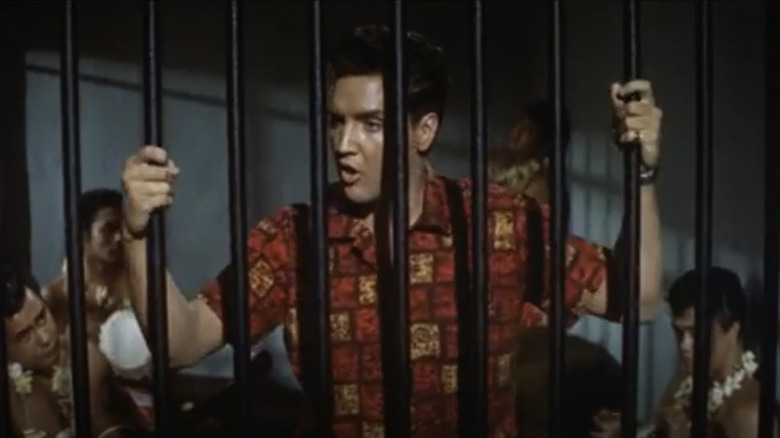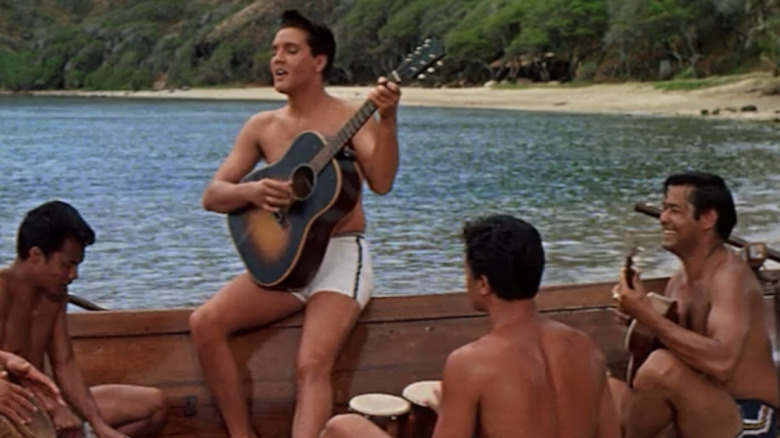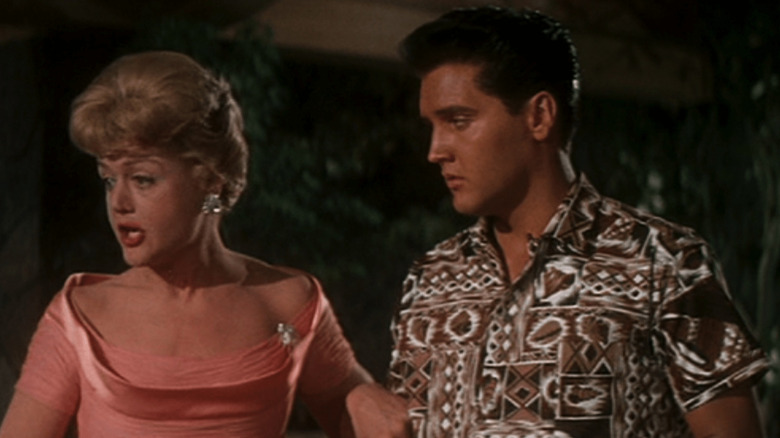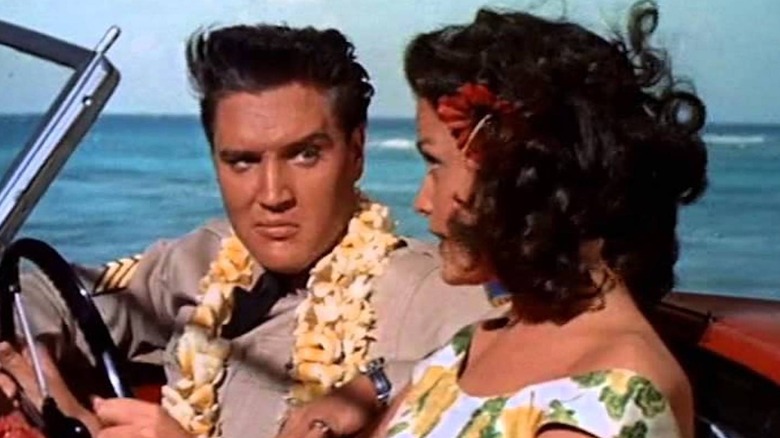Paramount Archivist Andrea Kalas On Spiffying Up Elvis Presley's Blue Hawaii For The 21st Century [Interview]
When Elvis Presley exploded onto the American music scene in 1956, he touched off a pop cultural firestorm that inflamed the passions of young people and infuriated the staid sensibilities of their parents. The gangly Tennessean's first salvo rockabilly singles –- namely "Heartbreak Hotel," "Don't Be Cruel," and "Hound Dog" –- were rebellion enough; paired with his electrifying stage presence and that wildly gyrating pelvis, Elvis represented either an insouciant, liberated future or the looming spiritual ruin of the United States. For the recording industry, Elvis was a crossover superstar they could beam into the country's living rooms via "The Ed Sullivan Show" and its variety ilk. Adults thought he looked ridiculous, but kids found him hip and devastatingly handsome. With charisma bursting off the charts, it was only a matter of time before Hollywood came calling.
Elvis would go on to star in over thirty movies, many of which adhered to a silly, yet satisfying formula wherein the singer would break into song whenever the spirit moved his character. In "Blue Hawaii," a simple drive home from the airport is occasion enough for Elvis to croon to his girlfriend. The movies may not be masterpieces, but they are significant, which is why cinephiles are thrilled by the sparkling new restoration of "Blue Hawaii" by Paramount's SVP of Asset Management, Andrea Kalas. Shot in widescreen Technicolor, The King's picturesque island romp has never looked better. It might not be "The Godfather," but for a hardcore Elvis fan like Kalas, cleaning up one of the singer's best movies was a dream come true. I recently hopped on Zoom with the archivist to get the lowdown on the film's digital facelift.
Can't help falling in love with big-screen Elvis
I have such a weird memory of watching Elvis movies when I was a kid. They were on the afternoon movie, back when that was a thing. I would just watch bits and pieces, kind of duck in and out. It wasn't until I got older that I would actually sit and watch these movies in their entirety. What's your background with Elvis movies?
I mean, very similar. I think that my relationship with Elvis is longstanding. I think people my age sort of came to him from sort of a kitsch element first, like velvet paintings and things like that. Then I listened to him and thought, "Oh my God, this guy's really amazing." And then the films. So by the time I got to Paramount, being in the archive, that was one of the great reasons I was thrilled to come here. "Oh, I can restore some Elvis films. Awesome." Because I love "King Creole," and I love "Blue Hawaii." We got to restore those. Those are two of my favorites. I mean, they're completely different, totally interesting, different moments in Elvis's career. Interesting to see what different kinds of music was being written for him at different points, and just the different tones of the film. Just fascinating, if you're an Elvis fan, to watch these two sort of evolve.
So it was wonderful to make them look more beautiful, because it had been a while and they needed some work, and sound more beautiful. Of course, great music, and really also just appreciate Elvis's dedication to acting, especially in "King Creole." It was really important to him to do well in that film. And he does really take the role really seriously. It was his favorite film. There's just so much. There are so many different strains about Elvis and thinking about Elvis into these movies. So I was thrilled to be able to spend time with each one of them. Because that's what you do when you restore it — just appreciate what went into making them.
Historically, "Blue Hawaii" came after "Wild in the Country." That was supposed to be kind of a serious movie. It was written by Clifford Odets. "Blue Hawaii" is kind of a return to the formula. Is that correct?
Or maybe the sort of creation of it a little bit, too. Because I do think that, yeah, that idea of the more commercial Elvis movies — girls, songs, girls, songs, girls, songs — which we love, I'm not saying anything bad about it. They're great. There's always good songs. There's always fun. "Blue Hawaii" was a real representation of that in a lot of ways, with a hilarious performance by Angela Lansbury in the middle of it, too.
The King and Angela
Angela Lansbury, two-time Oscar winner, and then the next year she does "The Manchurian Candidate." When you're restoring, do you ever reach out to the actors or anything for input on the filming, anything that might actually help you?
When we reach out for people to work with us, we're usually looking at the people that aren't necessarily in the film, but the people that made it. So directors, cinematographers, if they're around, which, in this case, not necessarily. And then also, we're looking for representations of what it should look and sound like, with original prints or other things like that. So that's our focus. It's not necessarily showing them to the performers. That's not necessarily part of the restoration process. But we do have screenings on a lot of some of our films from our library, and then we reach out to performers.
You say this one needed a lot of work. What in particular did you have to focus on with "Blue Hawaii?"
In "Blue Hawaii," it's a Technicolor color film. Beautiful saturated Technicolor work. It just hadn't been remastered or restored in a long time. So bringing that beautiful saturated work to the latest and greatest technology was really the idea we wanted to do. And in both films, the original title sequences that were optically done in the day ... you film the title over a filmed background. And what that means is, it's extra generations, so it's not as clear as the rest of the movie looks. It's really jarring. You're like, "Why does this title look so bad?" And then, "Oh, but now the movie looks good. Don't like that." So we have what's called a textless element, which is just the image. We scan that, and then we redo the title. So it's seamless now. So that was nice to be able to do for both of those films.
The cinematographer, Charles Lang, was a Paramount veteran, and I guess he was credited with inventing the house style in the [1930s]. Did his look mature or change when he went to color? And is there a defining aesthetic there?
I can't answer that specifically. I haven't done my Charles Lang research. But I will say, generally, I think it's not unusual for people that, especially as you're coming out of that time period where people are making sixty movies a year in the '40s and things like that, that the experienced hands at doing that, who knew so much, were hired to do things if there were new actors or new things. You wanted to pair up somebody who'd been around the block for a little while with somebody new. So that is probably why he was put in there, was because he just was trusted.
What about the sound? Obviously, it's such a big thing. It's the music, it's got to sound great. How did that restoration go?
So on "King Creole," it actually is a mono track, and we had some other elements. If we make a [5.1 surround track] for an older film that never had a 5.1, obviously, to begin with, we only do it if it really works, if we have those discrete tracks that we could mix well. We didn't on "King Creole." So that meant, we just spent a lot of time on that mono track, making sure that if we had original elements, we were listening to all of them and mixing them in if they were helpful, and just making it sound as beautiful as possible.
On "Blue Hawaii," again, just the same kind of process. Our music archivist and audio archivist checks through everything we have, to make sure if there's anything we can uncover we add that to the final mix, so it's as clear and seamless as possible.
The cultural and 4K future of Elvis Presley
For a movie like this, I'm kind of curious in terms of supplemental material or cut scenes, was there anything left from the filming of interest in that regard?
There's one thing ... I don't know if I can tell you about it, actually.
Oh.
Maybe a surprise coming up later.
Okay.
I'll leave it at that. There's something we discovered recently that maybe we'll be revealing later. I don't know. I never know what I'm supposed to talk about. So I'm going to just say that.
I understand. What kind of input did you get from Elvis Presley Enterprises? Do they have a say in anything?
They know what we're doing all the time. We have a really close relationship with them, and we've helped them when they're looking for other things from our archive, like stills or other things like that. But they're not interested, necessarily, in taking a look at the restorations. They're happy that they're done. So it's just that.
Again, it does look just absolutely spectacular.
Oh, thank you.
I was reading a piece yesterday, someone talking about how his kids didn't know who Elvis Presley was, and he thought Elvis was fading into obscurity. I thought that was weird because Elvis kind of changed the world in a way. Where does Elvis sit now for you in the culture? How do you think of him?
I've gone through my own Elvis journey. I've been to Memphis. I made the pilgrimage, right? I've thought about him and read a bunch of books about his start and where his musical influences came from, and I'm aware of some of the controversy sometimes of this. And watching "Blue Hawaii," there's definitely some non-woke moments, that's for sure. But I think that all of that has to be taken for the time he was around. And still, what I think ... no matter what's going on with Elvis in his life, in his movies, or what he was doing, or whatever he was doing in Vegas, his absolute, phenomenal talent is on display every single time. There is just something about that guy that is unlike anything else: The way he moves, the way he sings, the way he looks. If you're an Elvis fan, you know what I'm talking about. It's there.
So you're always going to enjoy it. You're going to enjoy it when you're watching these films. You're going to enjoy it watching an old Ed Sullivan Show. Whatever it is, you're going to enjoy it. And what's great about working on his films, too, is in addition to his performance, obviously, there are other things to enjoy about the filmmaking. So spending some time with how people create that film and where they went and what the locations were and the costumes and cinematography that make up that whole film, that's also a total pleasure.
Out of the Elvis films you've worked on, what's a standout sequence for you? What's your favorite?
I love "Trouble" in "King Creole." I mean it's a Lieber and Stoller song, and it's just fantastically performed by the band there. Elvis just knocks it out of the park, too. I could watch it a thousand times.
Is there an Elvis film out there that you haven't been able to get your hands on that you would just absolutely love to restore?
These were the ones that were really most in need and what we've focused on right now. I think we're always making sure that what we have is good on the other titles. Nothing right in the queue at the moment, but it could happen.
Interesting. Well, I'm really curious about what the thing that you can't reveal is, and I hope that we'll be hearing about that soon.
I'm sure you will. I'm sure you will. So, a little teaser for you. Sorry.
"Blue Hawaii" is currently available to own and stream in 4K Ultra HD Digital.



